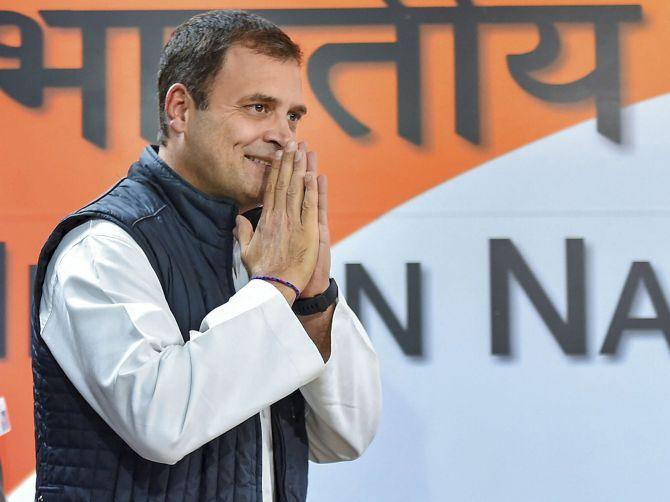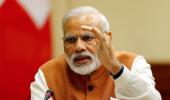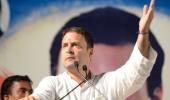'His humble words are no substitute for a clear vision for the future of the country. But humility has its own power, its own impact.'
'And it's probably more than that of a monogrammed suit,' says Shuma Raha.

If there was one word to describe Rahul Gandhi's press conference hours after it became clear that the Congress was going to snatch power from the BJP in three major Hindi heartland states, it would be 'low-key'.
The presser was obviously of huge interest. Politicians, political watchers and the people of the country were eager to find out how the 48-year-old Congress president, whose party has been hammered in several recent elections, would act after it had finally notched up some significant wins.
It was a proud moment for Rahul, but he seemed to consciously eschew the slightest trace of gloat or pride.
He spoke softly, thanked his party workers and, of course, criticised the Narendra Damodardas Modi government for its failures. But it was all done with quiet understatement, with an emphasis on the work that he and his party needed to do rather than the triumph that the day had brought.
At one point he remarked: 'I was telling my mother that the absolute best thing for me was the 2014 election. I learnt a lot from that election. I learnt that the most important thing is humility.'
At that press conference, at least, Rahul seemed to be practising a fair bit of what he professed to have learnt -- humility.
And it was a refreshing change from the narcissism, braggadocio and self-congratulatory bombast that has become the hallmark of most political leaders today.
Think the noxious arrogance of a certain leader of the free world; or think, closer home, the vainglorious leader who refers to himself in the third person and, among other things, tirelessly humble-brags about his humble origins.
As a virtue, humility has seen better days. In our show-and-tell world, where people are so full of themselves and their real or alleged achievements, any talk of humility is treated with scepticism.
It's become a pretty word, a special-occasion word, and a word that usually reeks of humbug. (Charles Dickens may have contributed to humility's slide into the bull**** department when he created the unforgettable character of Uriah Heep, a repellent villain who liked to insist that he was ' 'umble').
Today, when people get an award, they claim to feel 'humbled'. You get the top job, you're probably cock-a-hoop, but you put on a grave face and declare that you're overcome with humility.
Do we take these sentiments seriously?
Of course not. Likewise, when politicians talk humility, a quality that's rarely evident in their actions and speech, it smacks of pure hypocrisy.
We know that the very next instant they'll likely go back to flexing their muscles and flaunting their hubris.
The question is, can leaders -- political or otherwise -- ever be truly humble?
If their superior ability, talent, vision and ambition swept them to power, isn't arrogance par for the course?
Besides, if people want forceful, emphatic leaders, and it seems that most of us do, should they even try to be humble?
For humility is often confused with meekness -- and the meek, in contrast to what was promised in the Bible, aren't anywhere close to inheriting the earth. No wonder real humility is so out of style.
Yet as much as chest-thumping doesn't translate into strength, humility doesn't signify weakness. Humility means recognising that you don't have all the answers and you don't know it all.
It means you are able to set aside your egotism, be open to the views and ideas of others and carry people along with you. It means, in short, that your leadership qualities are based on democratic principles.
Mahatma Gandhi knew the power of humility. So did George Washington, a reluctant first president of the United States. Indeed, down the ages countless leaders, great and small, have practised the virtue -- or perhaps the art -- of humility to get to where they wanted to be.
Watching Rahul Gandhi at his press conference, there were those who wondered if his remarkable humility after a major victory verged on the diffident and the lacklustre.
Should he have been less self-effacing? More gung-ho? Hard to say.
Sure, his humble words are no substitute for a clear vision for the future of the country. But humility has its own power, its own impact. And it's probably more than that of a monogrammed suit.











